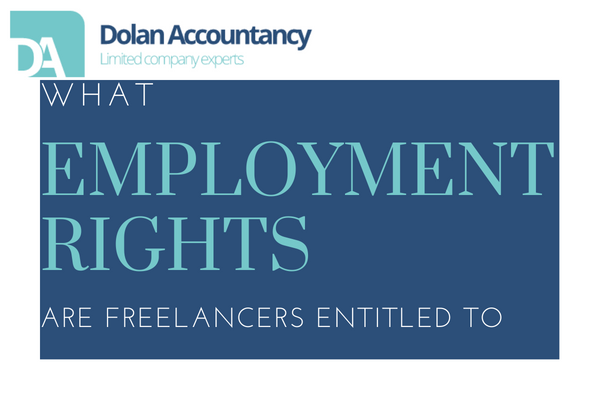Employment law doesn’t cover self-employed people in the same way, so let’s explore freelance employment rights.
Your rights as a freelance or contract worker
Your employment status affects your legal protection at work and impacts what employment rights you’re entitled to. If you’ve recently made the move to freelance or contract work, you might be wondering how your employment rights have been affected.
There are three main types of employment status under employment law (Employment Rights Act 1996):
- Employee
- Worker
- Self-employed
The freelance workforce is rapidly on the rise with around 4.29 million self-employed workers in the UK as of August 2022. It’s important to note that self-employed workers are not paid through PAYE, and they don’t have the same rights and responsibilities as an employee.
Contractors are often self-employed but they can have the employment status of a worker. Or, if they work for a client and are employed by an agency, they’ll have the employment status of an employee.
In this guide, we’ll explain the rights of a self-employed contractor and what you can expect from the companies you work with.
Your rights as a freelancer
Freelancers work as their own bosses and so aren’t covered by employment law in most cases. This means that things like sick pay and legal protection under company schemes don’t apply to freelancers.
Despite this, you have legal rights at work, whether you’re an employee, worker, freelancer or contractor. These rights include:
- Health and safety protection
- Protection against discrimination in the workplace
- Being legally protected by the terms of the contract with your client
- The right to a safe working environment
What employment rights are freelancers not entitled to?
With all the benefits of being self-employed, it’s important to understand that you do forfeit certain rights. Being your own boss can offer a great deal of freedom but certain employee benefits will no longer apply, including the following:
Sick pay
Statutory Sick Pay (SSP) is paid by an employer when an employee is unable to work due to illness. If you work for yourself, you don’t have an employer so you can’t claim sick pay.
However, if you find yourself unable to work due to sickness whilst being self-employed, you may qualify for the ‘new style’ Employment and Support Allowance (ESA). This depends on whether you’ve made enough national insurance contributions in the last two to three years.
Annual leave
Those who are self-employed don’t have any right to annual leave. However, depending on the nature of your work/contract, you may be given annual leave. For example, if you work via an agency or umbrella company as a contractor, you could be given an annual leave allowance based on the length of your contract.
Those self-employed workers who aren’t entitled to annual leave can still take holidays whenever they wish but they won’t be paid for the days they aren’t working.
Parental leave
Statutory Maternity Pay (SMP), Statutory Adoption Leave and Statutory Paternity Pay are all paid by employers and so self-employed workers aren’t entitled to any of these benefits.
However, self-employed women who are unable to work after having a baby may qualify for Maternity Allowance (MA). You can access this allowance for a total of 39 weeks if in the 66 weeks before your baby’s due you’ve:
- Been self-employed for at least 26 weeks
- Been earning at least £30 a week
Minimum pay
When you’re self-employed, you work as your own employer. This means that you set your own wages and so aren’t entitled to the National Minimum Wage. You might have your own personal rules of the minimum pay you’d accept from a client but you aren’t entitled to a minimum amount. It’s up to the client what they pay you and it’s up to you whether you accept.
Working time rights
The Working Time Regulations set a limit on the number of hours an employee can work in a week and what breaks they are entitled to within those hours. As a self-employed worker, you set your own working hours and so are exempt from any working time rights.
Umbrella company self-employment rights
If you work with an agency or as a contractor then you have the option of working through an umbrella company. This works by making you an employee of the umbrella company which means you gain the rights of regular employees. The umbrella company pays you as their employee, so the hassle of chasing clients for money is no longer a problem.
As a contractor, you’ll sign a contract of employment with the umbrella company which entitles you to the following benefits:
- The umbrella company will deduct any Income Tax and employee National Insurance contributions due under PAYE (Pay As You Earn) from your pay
- Statutory Maternity and Paternity Pay
- Statutory Sick Pay
- Pension scheme enrollment
- Annual leave
- National minimum wage
- Working time regulations
Working as a freelancer gives you a great deal of freedom to earn as much or as little as you like, set your own hours and only work on projects and for clients you’re passionate about. However, you do lose plenty of employment rights in the process. This is where umbrella companies can offer contractors the best of both worlds.
***
Thank you to Emma Bertie and Dolan Accountancy for this informative blog.
Please be reminded that if you need careers support, your Careers Team is only an email / a message away!
E: careers@westminster.ac.uk| Website | Facebook | Twitter | Instagram |Careers Blog
- An End-to-End Guide to Applying for Jobs: Where and When to Start! - 22 December 2025
- Graduate Success Series: a conversation with Ying Zhang - 18 December 2025
- Why Purpose is Your Greatest Asset in Higher Education - 23 October 2025
